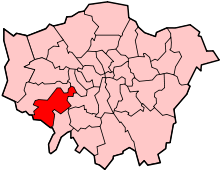Towpath murders
The towpath murders was a case in which two teenage girls were murdered on the towpath near Teddington Lock on the River Thames, England, on 31 May 1953. Alfred Charles Whiteway (born 1931) was found guilty and hanged for the murders, which attracted a deal of press attention, the case being described at the time as "one of Scotland Yard's most notable triumphs in a century".
At the trial, defence counsel Peter Rawlinson had subjected lead detective Herbert Hannam to what was at the time considered a very sharp cross-examination on Whiteway's contention that the main evidence against him had been manufactured by police.
Victims
The victims were 16-year-old Barbara Songhurst and 18-year-old Christine Reed. The girls had been on a bicycle trip on Sunday, 31 May 1953, and were seen cycling along the towpath beside the River Thames at about 11pm. They failed to return home. Songhurst's body was found the next day floating in the river, and Reed's body was found on 6 June, after a section of the river was drained. Pathologist Keith Mant determined that both victims had been beaten, raped and killed with a hatchet.[1]
Investigation
Alfred Charles Whiteway, 22 years old, separated from his wife and living with his parents in Sydney Road, Teddington, was arrested a month later after the two separate rapes of women in Surrey. At first, he denied any involvement. Later, a PC found an axe under the back seat of a police car in which Whiteway had apparently hidden it following his arrest for the rape of a 14-year-old girl and an attack on a woman in the Oxshott Heath and Woods. The axe was found at the house of the police constable, who had taken it home and was using it to chop wood.
Forensic tests of the time could only inconclusively link traces of blood on the axe and Whiteway's shoes to the murders, but his signature to what police said was a confession taken down by them was crucial evidence for the prosecution. Whiteway however, always insisted he had been told to sign at the bottom of a blank sheet of paper and police had simply manufactured the confession.[1][2][3][4][5][6]
Trial
Whiteway was tried at the Old Bailey in October and November 1953 before Mr Justice Hilbery. He was defended by solicitor Arthur Prothero, who instructed Peter Rawlinson, then a relatively junior barrister. Rawlinson cross-examined murder squad detective Herbert Hannam at length, opening large holes in his evidence of the confession, which Whiteway claimed was a work of fiction.
Press reports complained at the implication that the police were lying.[1] In view of police methods of the time, and Hannam's book expressing the opinion that the law sometimes must be ignored by detectives, subsequent commentary has thought it not unlikely that Whiteway had been "verbaled".[6]
On 2 November, after forty-five minutes of deliberation, the jury found Whiteway guilty.[7] An appeal was heard by the Lord Chief Justice (Lord Goddard), Mr. Justice Sellers and Mr. Justice Barry but was rejected on 7 December.[8] Whiteway was hanged at Wandsworth Prison on 22 December 1953. The axe is in the Black Museum at Scotland Yard.[1]
References
- Cullen, Pamela V. (2006). A Stranger in Blood: The Case Files on Dr John Bodkin Adams. London: Elliott & Thompson. ISBN 1-904027-19-9.
- The Canberra Times, 17 September 1953
- The Canberra Times, 30 October 1953
- Life magazine, 22 April 1957 at Google Books
- National Archives Freedom of Information Requests, June 2006; http://www.nationalarchives.gov.uk/documents/foi-june2006.pdf
- "The Towpath Murders", "Murder Maps" Series 3 Episode 3, broadcast 26 October 2017, presented by Nicholas Day on Yesterday (TV channel)
- "Murder On Towpath: Whiteway Found Guilty, Sentence Of Death". The Times (52769). London. 3 November 1953. p. 2.
- "Towpath Murder Appeal Dismissed, Regina v. Whiteway". The Times (52799). London. 8 December 1953. p. 5.
